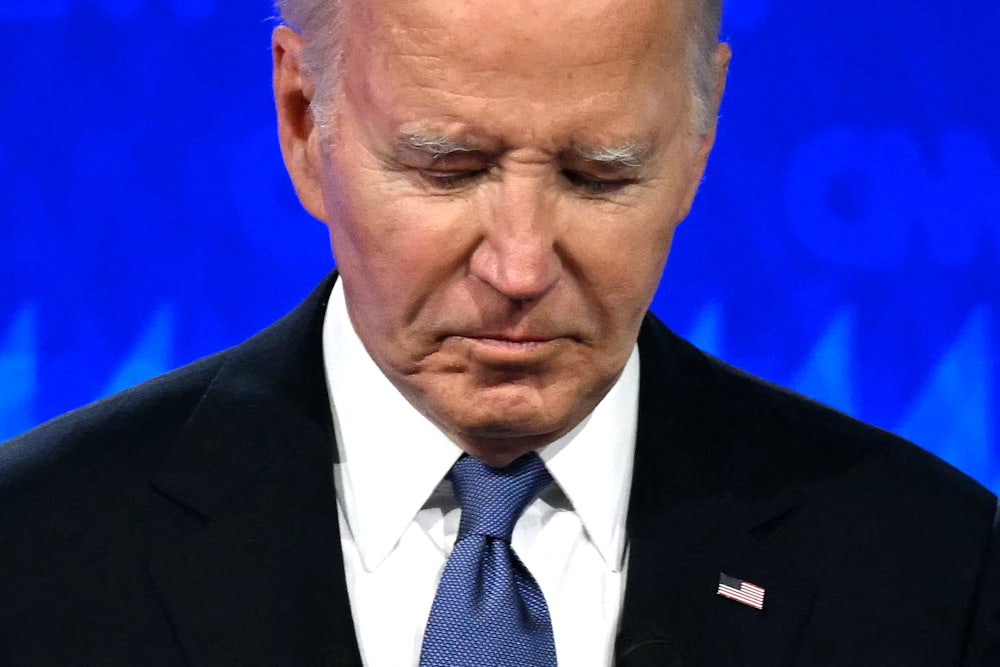As signs of Joe Biden’s mental and physical decline grew worse throughout his presidency, he nonetheless insisted everything was fine. “Look, I have a cognitive test every single day. Every day I have that test. Everything I do,” he said last July, after ABC News’s George Stephanopoulos asked if he would be willing to undergo an independent evaluation that included neurological and cognitive tests. “You know, not only am I campaigning, but I’m running the world.” We now know, from Jake Tapper and Alex Thompson’s revelatory new book, Original Sin, that Biden and his closest advisers decided against taking such a test earlier in 2024—possibly because they feared what the results might show.
Many people across the political spectrum are now calling this a cover-up, and they’re right to do so: Original Sin includes extensive, damning evidence that Biden’s team went to great lengths to hide the extent of his decline from the public. But a cover-up only goes so far in explaining what happened in the 2024 election. It is part of the story, but far from the full story.
Tapper and Thompson make it clear that several key people in Biden’s orbit understood that his health was declining and chose to do nothing. Others, including Biden and his family—and likely many others working closely with him—appeared to be in deep denial of what was obviously true: He was unwell. We now know that Biden was likely suffering from cancer during the end of his presidency, after he revealed Sunday that he has been diagnosed with an advanced form of prostate cancer. Political aides are not oncologists, of course, but Original Sin provides countless examples of the president displaying evidence of physical and cognitive decline, which was then ignored, excused, or denied by aides, family members, and other close allies.
So it’s understandable that the notion of a cover-up has taken hold: It’s a succinct, accurate way to describe what happened. Republicans are pouncing on the book’s revelations to accuse the Democrats of putting the country in danger by allowing a mentally diminished president to remain in office. Meanwhile, Democrats are saying the book proves that Biden never should have run for reelection, which would have given the party a proper primary season to pick the best candidate to defeat Trump.
But for many, both in politics and in the press, the notion of a cover-up is also appealing because it lets them off the hook. After all, Biden’s decline was evident to anyone who watched him walk or speak throughout his presidency; not even the CIA could have covered it up. And the public, who had seen a fitter Biden during the Obama presidency, certainly wasn’t in the dark about it. Opinion surveys from 2021 onward showed that a growing majority of voters understood that the president was aging, that he was declining, and that he was not fit to serve two terms as president. And that points to a more troubling conclusion: Many Democrats outside the White House and many in the media either failed to recognize what was obviously happening or failed to treat it with the seriousness it deserved.
Again and again in Original Sin, Democratic insiders point to the 2022 midterm elections—which coincided with a period when Biden’s son Hunter began to face serious legal challenges—as the moment when Biden’s steep decline began. That may very well be true. When one compares Biden’s public appearances and interviews from the first two years of his presidency to the (even rarer) public appearances and interviews from the last two, there is certainly a troubling shift. Biden was more prone to fits of incoherence and outbursts in his final two years and more likely to trail off, either into a muddle of barely audible nonsense or into complete silence. But by then, most voters—including most Democratic voters—had already decided that Biden was too old to serve four more years.
In the summer of 2022—long before the period accepted by most Democratic officials as the beginning of Biden’s steep descent—61 percent of Democrats surveyed in a New York Times/Siena College poll said that they wanted someone else to serve as their party’s nominee in the 2024 election. The top reason cited for the desire to see a change at the top of the ticket? Age. Indeed, concerns about Biden’s age almost certainly played a significant role in his consistently abysmal approval rating. In August 2021, an Associated Press/Ipsos poll found that 77 percent of voters didn’t believe Biden was fit to “be effective” to serve until 2029. That poll preceded by a few days the disastrous pullout from Afghanistan, which, judging from the irreversible toll it took on his approval rating, was the defining moment in his presidency. By the start of September 2021—just seven months into his first year in office—a majority of Americans were coming to the conclusion that Biden wasn’t up to the task of being president.
How did Biden hang on? Original Sin, which I reviewed for The Washington Post, points to several compelling reasons. There were certainly good-faith reasons why some Democrats failed to raise the issue: They worried about sowing intraparty discord before a pivotal election that could return Trump to power. Others may have simply clung on to false hope—unsupported by polling—that Trump’s criminal cases would sink him or that Biden’s fortunes would dramatically shift once the election became a contest between an incompetent buffoon who had only recently tried to overthrow American democracy and a very old man who often struggled to speak coherently.
But the Biden White House also went on offense. Speaking out about Biden could mean career suicide. Anyone who dared suggest that the president was too old was portrayed as a de facto supporter of authoritarianism—the idea being that any criticism of Biden only helped Trump. It was a cynical line, but it was effective—and it was embraced by many of the president’s supporters, who would eagerly mob any reporter or Democratic politician who raised legitimate questions about the president’s fitness. The result was a chilling environment aimed at quashing both intraparty dissent and journalistic inquiry.
Biden and those closest to him used tactics that can only be described as Trumpian—denying any and all accusations, attacking the credibility of anyone who dared make them, and attempting to concoct an elaborate fantasy where an incompetent man was, in fact, a figure of world historical greatness. The result was an epic disaster: We are living under an authoritarian regime thanks to Biden and his craven, malicious loyalists.
In the author’s note at the start of Original Sin, Tapper and Thompson cite one of Orwell’s most famous quotes: “To see what is in front of one’s nose needs a constant struggle.” That certainly applies to how Washington fumbled the problem of Biden’s decline. Democrats and most of the political press looked the other way, perhaps out of politeness—it’s rather rude to imply someone is senile—or out of fear. Maybe they did so because they thought the White House was right and that raising concerns about Biden’s fitness would only benefit Trump. Maybe some even believed the Biden aides who insisted he was still fit and sharp.
Those aides may have attempted to conceal Biden’s condition, but they hardly covered it up. Biden’s physical and mental state was obvious to anyone with eyes and ears; the public made clear in poll after poll that it was aware of his deteriorating condition. Rather than a cover-up, this was a dereliction of duty in the Democratic Party and the media, if not an outright mass delusion. And the people who had the power to change the course of 2024, and therefore prevent the horror show we are now living in, didn’t come to their senses until it was much too late.






